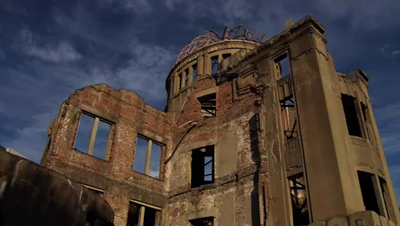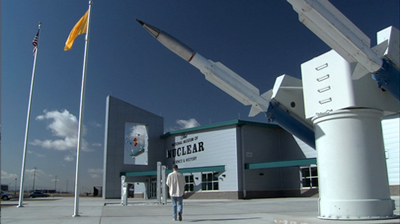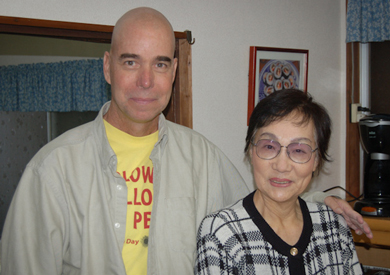
 |
|
|
|
The Forgotten Bomb is a handsomely produced and sincerely thought out "reminder" documentary about a big subject that, the producers feel, is not receiving adequate public attention and awareness. In today's Information Age it is nearly impossible for the body politic to concentrate on any particular issue for more than a day or two -- some pundit or politician will usurp the media spotlight, redirecting the public's attention with a new accusation or scandal. The show follows host / spokesman Bud Ryan as he dispels the widely held notion that, due to the official end of The Cold War, the w nuclear standoff has been cancelled. Ryan shows that the situation is just as it ever was, with Russian and U.S. missiles remaining trigger-ready to strike. The body of the show takes shape as Ryan travels across the United States and to Japan to do a survey of public policies and attitudes about the nuclear threat. We visit various 'nuclear museums' including a missile silo; among Ryan's interviewees are museum docents, a few official spokesmen, a scientist from the original Manhattan Project, an author or two and ex- Secretary of State George Schultz. 
DIrector Stuart Overbey further illustrates his thesis with footage from older government information films, which constantly promote nuclear research and bomb building as a positive and safe activity. New animation dramatizes the various national stockpiles of nukes. Other animation plays with cartoonish images when the show discusses some frightening nuclear accidents. Ryan's requests for access to one particular museum were coldly turned down, and a number of government agencies, nuclear industry companies and elected representatives refused to answer his emails or return phone calls. The show mocks some of these people with animated caricatures, an unnecessary "Michael Moore"- type tactic that grates against the film's predominantly thoughtful tone. It's true that post- 9/11 policies give corporations a license to take security measures to extremes. But then again, there are enough annoying investigative reporters out there to give any company a reason to pull up the drawbridge. The film's most authoritative spokesman George Schultz describes the present situation as very dangerous and now firmly believes that total disarmament is essential. Most of the other docu participants are anti-nuke authors or committed activists with a definite agenda to sell. When their message is clearly stated, these advocates are very convincing. A married couple responds to alarming claims that government and private nuclear facilities routinely dump highly radioactive materials in ways that could harm people or poison the groundwater. They take us to a gulley not far from a residential development, that a nuclear facility claimed had been cleaned up. Donning protective clothing, they prove with Geiger counters that it is still quite "hot". Other arguments tackle thorny subjects that would require hours of debate to fairly assess. The movie backs the pacifist position that the U.S. bombed Japan not to end the war and save millions of lives, but for much less savory political purposes. One particular spokesman claiming that the bombing was justified is "exposed" as a hard-nosed militarist. Unlike the filmmakers, he's old enough to have personally experienced WWII: for him and millions of Americans threatened by the Japanese, revenge was a perfectly sound motive. At the end of the show a roundup of statements caps this spokesman's testimony with what the filmmakers surely feel is a bitter remark by an unreconstructed Japan-hater. The world of 1945 and the definition and meaning of War were different then. The Forgotten Bomb wastes its time by trying to simplify this particular controversy. 
On the other hand, one of the authors interviewed makes a compelling argument that the most logical reason for President Kennedy's assassination was his determination after the Cuban Missile Crisis to arrive at a nuclear disarmament treaty with the U.S.S.R.'s Nikita Khruschev. Too many U.S. industries saw the nuclear arms race as a way to snag billions of defense dollars, more than enough motivation for a conspiracy to eliminate Kennedy. Khruschev's own fall from power a year later could very well have been a result of his failed peace policy with our country. The Forgotten Bomb politely demonstrates that, despite the official slant on the subject, America has never been interested in nuclear disarmament. The author names three historical lost opportunities, the last occurring in 1985 when Ronald Reagan turned down Gorbachev's proposal for an immediate bi-lateral stand-down. Reagan wouldn't abandon our Strategic Defense Initiative "Star Wars" program, a technical near-fantasy invented to siphon more defense billions into the coffers of private contractors. Interviewer Ryan and several other moral and spiritual spokespeople also point up the contrast between American and Japanese museum displays of the Hiroshima and Nagasaki bombings. The Japanese exhibits dwell on disturbing photos and even dioramas depicting hideously charred corpses and other results of the bombing. But museums promoting nuclear policies in the U.S. omit representation of the horrors suffered by the Japanese people, preferring instead to remark on the benefits of nuclear medicine, etc. The implication is that the American public is in no hurry to come to terms with the consequences of its government's actions. People are skittish when it comes to facing the evidence of atrocities, especially disturbing images. The Japanese are no different in this respect. However one looks at it, we victors can be callous in our attitude toward civilian victims of our weapons of mass destruction. A political candidate is allowed to make a joke about mass murder by singing a Beach Boys song with altered lyrics without official censure: "Bomb bomb bomb, bomb-bomb Iran". The Forgotten Bomb accurately suggests that too many Americans are more impressed by the destructive power of the bombs, than their potential for human calamity. When the show attempts to draw moral conclusions about the end of WW2, it strays out of its depth. That elder spokesman says it all when he protests that the mass destruction of Japanese cities with conventional firebombs was far more devastating and deadly than the two nuclear strikes. The man isn't being insensitive or dodging the question. For veterans the atomic bombs were simply a more efficient and more dramatic way of stopping the carnage, the faster the better. The Forgotten Bomb is more successful at communicating to the younger audience that needs to appreciate the gravity of the nuclear threat, whether it be a bomb constructed by a rogue state or some greedy company poisoning the landscape with lethal radioactive waste. This is an advocacy docu and not an even-handed investigation. The even-handed interviewer Bud Ryan nods in sympathy with the opinions of pacifists and stares in sad disapproval whenever a discouraging word is heard. Seeing as how most official information sources quietly endorse the pro-nuke status quo, I personally have no differences with this docu's strategy. It's easy to endorse The Forgotten Bomb as thoughtful and constructive even if one or two of its arguments are less than compelling. 
Bud Ryan and interviewee Emiko Okada The docu's excellent production values are a big plus. Some of the vintage film clips look much better than the samples seen in groundbreaking older shows like The Atomic Cafe. Seeing this program makes us want to go back and rebuild Cafe with remastered source material. The new camerawork is good and Stuart Overbey's direction is free of overstatement (outside of those unnecessarily sarcastic animation sequences). The show isn't for small children, due to some of the images and gruesome verbal descriptions by a Hiroshima survivor of mutilated bomb victims. But it might be an excellent advent into the subject of nuclear politics for younger viewers who never heard of On the Beach, Doctor Strangelove or The War Game. As much as I admire The Atomic Cafe, younger audiences see it as a comedy and do not respond as we did to the serious issues behind its satiric barbs. I think that the Information Age is making satire obsolete. Political candidates respected by millions can make outrageous untrue statements or just hateful and ignorant remarks, without encountering serious censure. A great many people are no longer capable of separating comic exaggeration from reasonable discourse. To its credit, The Forgotten Bomb is direct and sincere. Cinema Libre Studio's DVD of The Forgotten Bomb is an excellent encoding of this video production that makes use of graphics and older film content in excellent condition. The menu contains several extended interviews and trailers for this show as well as teasers for some other Cinema Libre docus.
On a scale of Excellent, Good, Fair, and Poor,
The Forgotten Bomb rates:
Reviews on the Savant main site have additional credits information and are often updated and annotated with reader input and graphics. Also, don't forget the 2011 Savant Wish List. T'was Ever Thus.
Review Staff | About DVD Talk | Newsletter Subscribe | Join DVD Talk Forum |
| ||||||||||||||||||